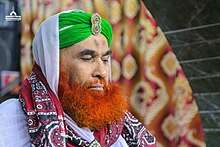Ilyas Qadri
Muhammad Ilyas Attar Qadri Razvi Ziaee (Urdu: محمد الیاس قادری رضوی ضیائی) known as Attar (عطار), is a Pakistani Sunni Muslim scholar and main leader of Dawat-e-Islami who is also known for establishing Jamia-tul-Madina, a chain of madrasas. He is the author of Faizan-e-Sunnat [1]He is ranked among The 500 Most Influential Muslims by the Royal Islamic Strategic Studies Centre in Amman, Jordan.[1]
Muhammad Ilyas Attar Qadri | |
|---|---|
ابو بلال محمد اِلیاس عطّارؔ قادِری رَضَوی | |
 Ilyas Qadri on Occasion of Milad un Nabi 2017 at Global Madani Markaz, Karachi. | |
| Born | Muhammad 12 July 1950[1] |
| Nationality | Pakistani |
| Known for | Founding Dawat-e-Islami |
Notable work | Faizan-e-Sunnat |
| Television | Madani Channel |
| Title | Attar |
| Movement | Barelvi |
| Website | https://www.ilyasqadri.com https://www.dawateislami.net |
Biography
Qadri was born on 12 July 1950[1] in a Memoni family in Karachi, Pakistan. He is a Sufi scholar of the Qadri Rizwi order and founder of Dawat-e-Islami[2], a global organization of Sunnis spread over 180 countries.[1][3][4][5][6]
Qadri studied for 22 years under Muhammad Waqaruddin Qadri at Darl Uloom Amjadia, Karachi.[7]
Qadri is a leader and a founder of the Qadiri-yya, Rizviyya, Attariyya branch of the Qadriyya Sufi order.[1] [8]Qadri is a widely-re- spected sheikh with a significant international following which is supported by the Madani TV Channel.[1][8]He has authored over 30 books, including Faizane-Sunnat on the mer- its of good conduct.[1][8]His most remarkable quote is, “I Must Strive to Reform Myself and the People of the Entire World.”[1][8]
Forefathers
His forefathers were from the village of Kutyanah in Junagarh, India. His grandfather, Abdur-Raheem was a pious man. His father Haji Abdur Rahman was also a pious man. He served the Hanafi Memon Mosque in Sri Lanka in various capacities for many years. After the formation of Pakistan, his parents migrated to Pakistan. They first came to Hyderabad, and then moved to Karachi.[9]
Bay’at and Khilafat
He is the Mureed (disciple) of Shaykh Zia-ud-din Madani, who was khalifa of Imam Ahmad Raza Khan. He possesses deep respect and admiration for Imam Ahmad Raza Khan.
The son of Shaykh Zia-ud-din Madani, Shaykh Fadlur Rahman bestowed him with his Khilafah. He also received khilafah from Grand Mufti of Pakistan, Mufti Waqar-ud Din. (The Commentator of Sahih Bukhari)
Allamah Shaykh Mufti Shariful- Haq Amjadi has also granted him with his Khilafah [Successor-ship] of the four major Spiritual Sufi Orders [Silasil]: Qadiriyyah, Chishtiyyah, Naqshbandiyyah, and Suharvardiyyah. He also gave him permission of transmission of the books of Hadis, and dissemination of Islamic knowledge [Ijazah] etc. Furthermore, he also holds Khilafah from several other great scholars of the Muslim world, as well.[9]
He takes bayat in silsila Qadriya of Shaykh Abdul Qadir Gilani. He is devotee of Ghaus e Azam, Shaykh Abdul Qadil Gilani.
Dawat-e-Islami
Ilyas Qadri had a passion for the reforms of Muslims. With this spirit, He founded Dawat-e-islami in 1401 A.H. It has made several achievements in the propagation of Islam. It has reached many countries across the globe. Thousand of Muslims have come to the right path, repenting from their sinful lives. Many Non-Muslims have reverted to Islam by the efforts of Dawat-e-Islami.
Dawat-e-Islami has made a great contribution in promoting Islamic education. It has made thousands of Madaris where children and adults learn and memorize Quran, and Jamiat ul Madinah where Islamic scholars education (called Dars e Nizami) is being taught.
Dawat-e-Islami has more than hundred departments; some of them are Islamic Jurisprudence, Madani Channel, Madrasa tul Madinah, Jamia tul Madina, Departments of Mosque Service, Madani Inamat and Madani Qafila, etc.[9]
Publications
Along with Faizan-e-Sunnat, his publications include:[7][10][11]
- Laws of Ṣalāĥ
- Priceless Diamonds
- Cure for Anger
- I want to rectify myself
- Method of becoming Pious
- Cure for Sins
- Test of the Grave
- Shocks of the Deceased
- Heedlessness
- The Four Donkeys of Satan
- Calls of the River
- Deserted Palace
- Bones of the Kings
- Sweet Words
- Khūdkushī kā ‘ilāj
- Ẓulm kā Ānjām
- Solution for Conflicts
- Miracles of Imām Ḥussaīn
- Rafīq-ul-Ḥarāmaīn
- Blessings of Ramadan
- Antidote to Suicide
- Luminous Face
See also
External links
References
- The 500 Most Influential Muslims (PDF) (2020 ed.). Royal Islamic Strategic Studies Centre. p. 109. Retrieved 25 April 2020.
- Afzal, Madiha (16 March 2018). Pakistan Under Siege: Extremism, Society and the State. ISBN 9789353050054. Retrieved 24 April 2020.
- Correspondent, A. (21 October 2002). "Da'awat moot concludes". DAWN.COM.
- Kamran Yousaf (12 September 2011). "Dawat-e-Islami comes under military's radar". The Express Tribune (newspaper). Retrieved 6 December 2018.
- N. K. Singh (2009). global encyclopedia of Islamic mystics and mysticism. India: Global Vision Publishing House, India. p. 270. ISBN 978-81-8220-673-1.
- Dunya, Sindhi (7 February 2018), "Muhammad Ilyas Qadri: The Notable Islamic Cleric of Sindh", Sindhi Dunya, archived from the original on 7 December 2018, retrieved 6 December 2018
- "Muhammad Ilyas Attar Qadiri". The Muslim 500.
- "Muhammad Ilyas Attar Qadiri". The Muslim 500. Retrieved 9 June 2020.
- Attar - The Life and the Journey. UK: Maktaba tul Madinah. 2010.
- "Books by Muhammad Ilyas 'Attar Qadri Razavi (Author of Faizan e Sunnat)". www.goodreads.com.
| Wikiquote has quotations related to: Ilyas Qadri |